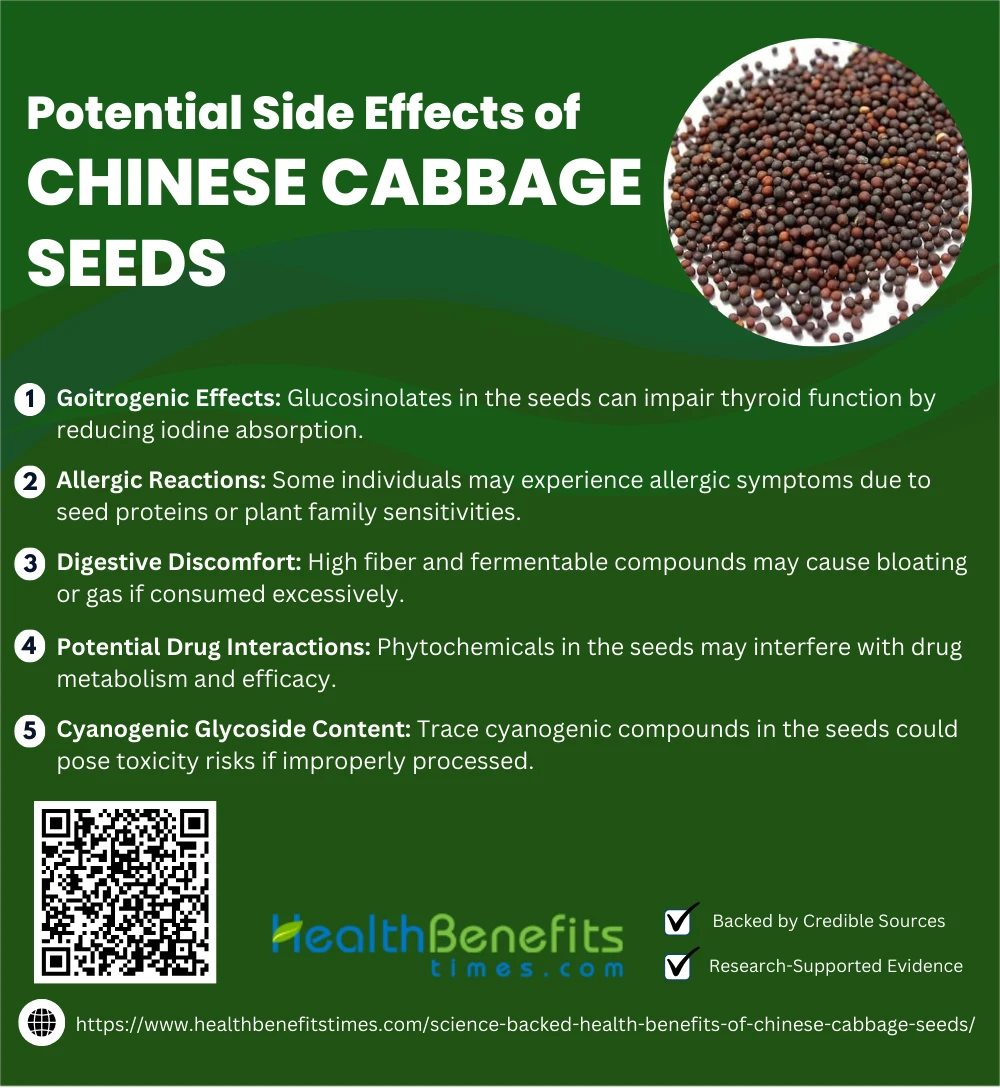- Chinese cabbage seeds are nutrient-rich seeds derived from the Brassica rapa plant, traditionally used in Asian diets and herbal medicine.
- Packed with antioxidants, glucosinolates, and essential nutrients, these seeds offer science-backed support for heart, immune, and digestive health.
- Research highlights their potential in reducing inflammation, protecting against certain cancers, and promoting overall wellness when consumed mindfully.
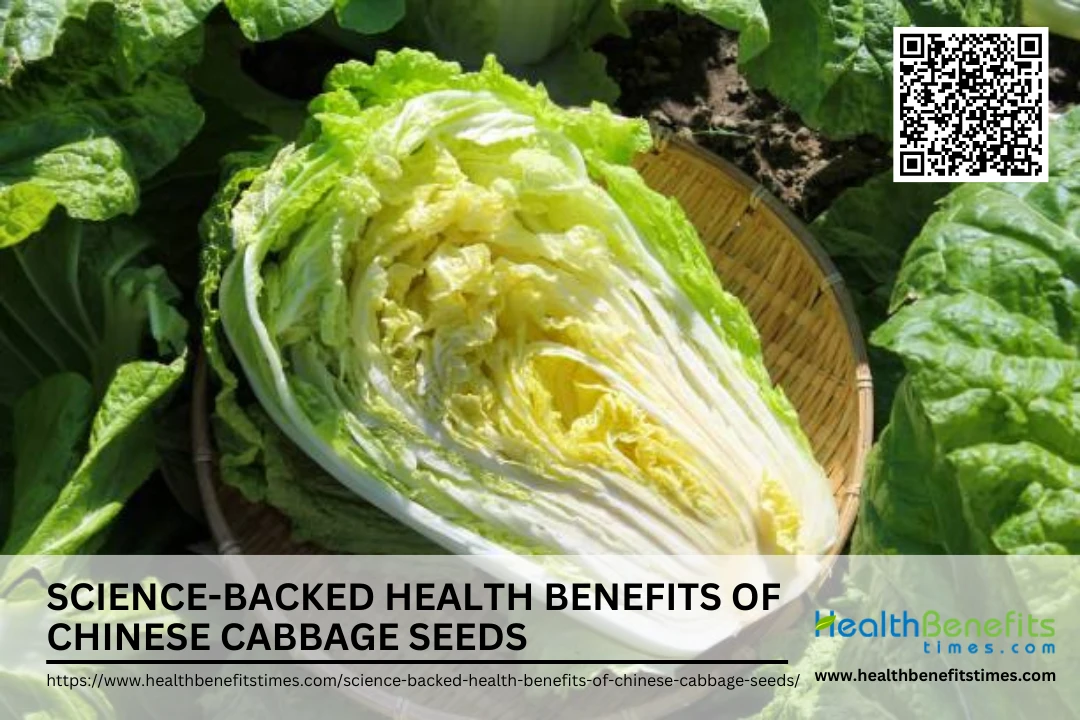 Chinese cabbage seeds are the reproductive units of Brassica rapa subsp. pekinensis, widely cultivated in East Asia and valued for their phytochemical richness and germination potential in both agricultural and nutritional contexts. In recent years, Chinese cabbage seeds have emerged as a promising source of bioactive compounds with significant implications for health and disease prevention. Rich in antioxidants, polyphenols, and glucosinolates, these seeds exhibit therapeutic properties that support cardiovascular function, modulate inflammation, and enhance metabolic balance. Research indicates that their germination enhances biomass and nutritional density, which has led to their incorporation in functional food formulations. Additionally, their capacity to remediate soil while maintaining nutritional value underscores their ecological and health-related potential. As investigations into plant-based nutraceuticals expand, Chinese cabbage seeds stand out as a multifaceted candidate for both dietary enrichment and therapeutic development.
Chinese cabbage seeds are the reproductive units of Brassica rapa subsp. pekinensis, widely cultivated in East Asia and valued for their phytochemical richness and germination potential in both agricultural and nutritional contexts. In recent years, Chinese cabbage seeds have emerged as a promising source of bioactive compounds with significant implications for health and disease prevention. Rich in antioxidants, polyphenols, and glucosinolates, these seeds exhibit therapeutic properties that support cardiovascular function, modulate inflammation, and enhance metabolic balance. Research indicates that their germination enhances biomass and nutritional density, which has led to their incorporation in functional food formulations. Additionally, their capacity to remediate soil while maintaining nutritional value underscores their ecological and health-related potential. As investigations into plant-based nutraceuticals expand, Chinese cabbage seeds stand out as a multifaceted candidate for both dietary enrichment and therapeutic development.
Nutritional and Phytochemical Composition of Chinese Cabbage Seeds
Chinese cabbage seeds are packed with essential nutrients and bioactive compounds, including proteins, healthy fats, vitamins, minerals, and antioxidants, contributing to their growing importance in health and nutritional science.
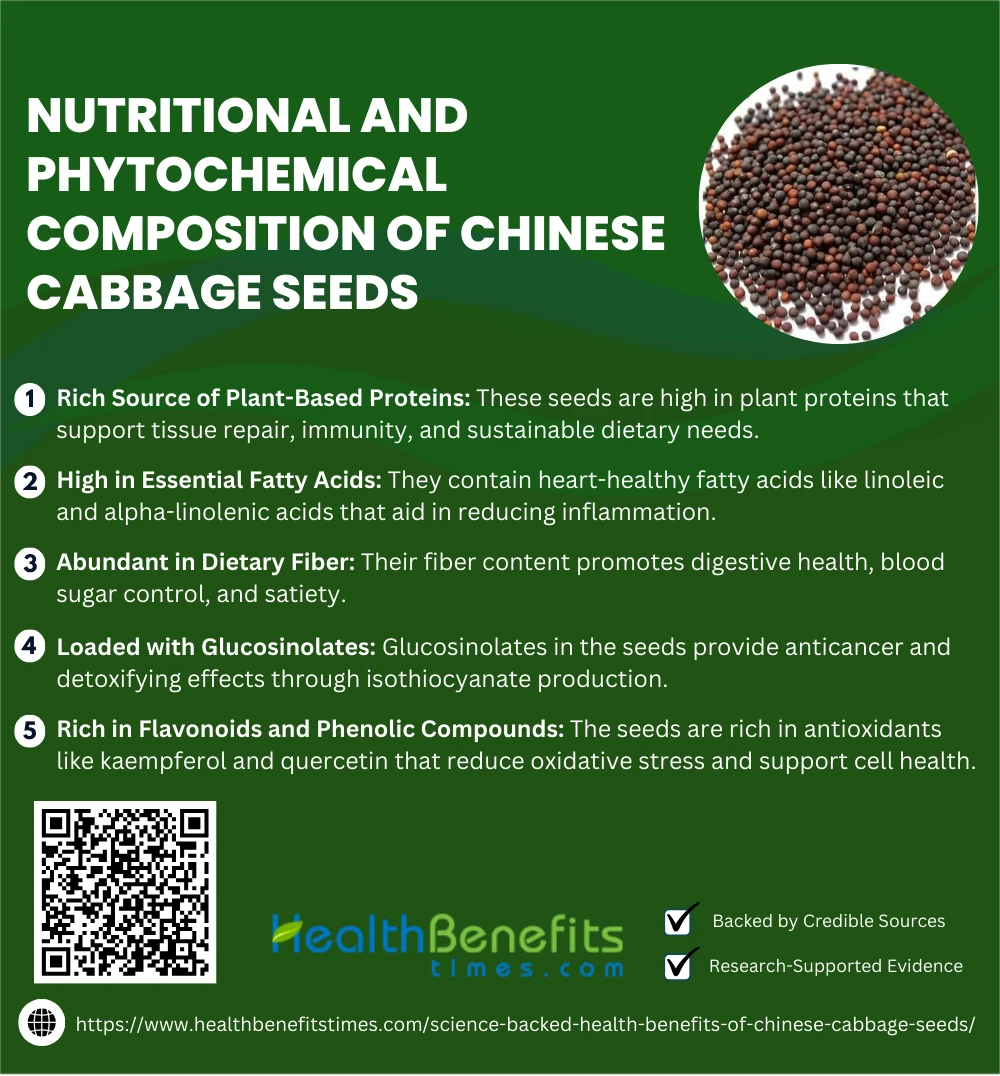 1. Rich Source of Plant-Based Proteins
1. Rich Source of Plant-Based Proteins
Chinese cabbage seeds contain significant levels of plant-based protein, essential for tissue repair and immune function. This makes them a sustainable protein alternative, especially in vegetarian diets. Research shows they support early-stage plant growth and contribute to dietary amino acid intake.
2. High in Essential Fatty Acids
These seeds are a natural source of essential fatty acids like linoleic and alpha-linolenic acids. These contribute to heart and brain health by reducing inflammation and supporting lipid metabolism. Studies highlight their potential in functional food applications for cardiovascular wellness.
3. Abundant in Dietary Fiber
Chinese cabbage seeds offer a good amount of dietary fiber, which supports digestive health, glycemic control, and satiety. The fiber content is especially beneficial in gut microbiota regulation and chronic disease prevention.
4. Loaded with Glucosinolates
A signature phytochemical in Brassica species, glucosinolates in Chinese cabbage seeds exhibit detoxifying, anticancer, and antimicrobial activities. On hydrolysis, they produce isothiocyanates known for their chemoprotective properties. Their health-promoting bioactivity is well-documented in seed-based therapeutic formulations.
5. Rich in Flavonoids and Phenolic Compounds
Flavonoids such as kaempferol and quercetin, along with phenolic acids, impart strong antioxidant properties to Chinese cabbage seeds. These compounds help reduce oxidative stress and are involved in cellular signaling and protection. Their concentration increases significantly during germination.
Comparison to Other Brassica Seeds (e.g., mustard, broccoli)
| Feature | Chinese Cabbage (Brassica rapa subsp. pekinensis) | Mustard (Brassica juncea / B. nigra) | Broccoli (Brassica oleracea var. italica) |
| Seed Size | Small, ~1.5–2 mm | Small to medium, ~1–2.5 mm | Small, ~1–2 mm |
| Seed Color | Dark brown to reddish | Brown, yellow, or black | Brownish or dark purple |
| Oil Content | Low (~20% or less) | High (~30–40%) | Very low (<20%) |
| Germination Rate | Fast (2–4 days under ideal conditions) | Fast (2–4 days) | Moderate (4–7 days) |
| Primary Use of Seeds | Vegetables, microgreens | Oil production, condiments, sprouts | Vegetable, microgreens |
| Seed Shape | Round, smooth | Round, some wrinkled | Round, smooth |
| Nutrient Profile (Sprouts) | Rich in Vitamin C, folate | Rich in selenium, omega-3s | High in sulforaphane (anti-cancer compound) |
| Flavor (Sprouts) | Mild, slightly sweet | Spicy, pungent | Mild to slightly bitter |
| Storage Life | 3–5 years (if dry and cool) | 4–6 years | 3–5 years |
| Common Cultivation Zones | Temperate climates (Asia, Europe) | Warm and temperate (India, Canada) | Cooler climates (USA, Europe, China) |
| Disease Resistance (seeds) | Moderate | Variable (some lines highly resistant) | Sensitive to damping-off and clubroot |
Science-backed Health Benefits of Chinese Cabbage Seeds
Chinese cabbage seeds offer numerous science-backed health benefits due to their rich nutritional and phytochemical profile, supporting antioxidant defense, inflammation reduction, heart health, immunity, and potential protection against chronic diseases.
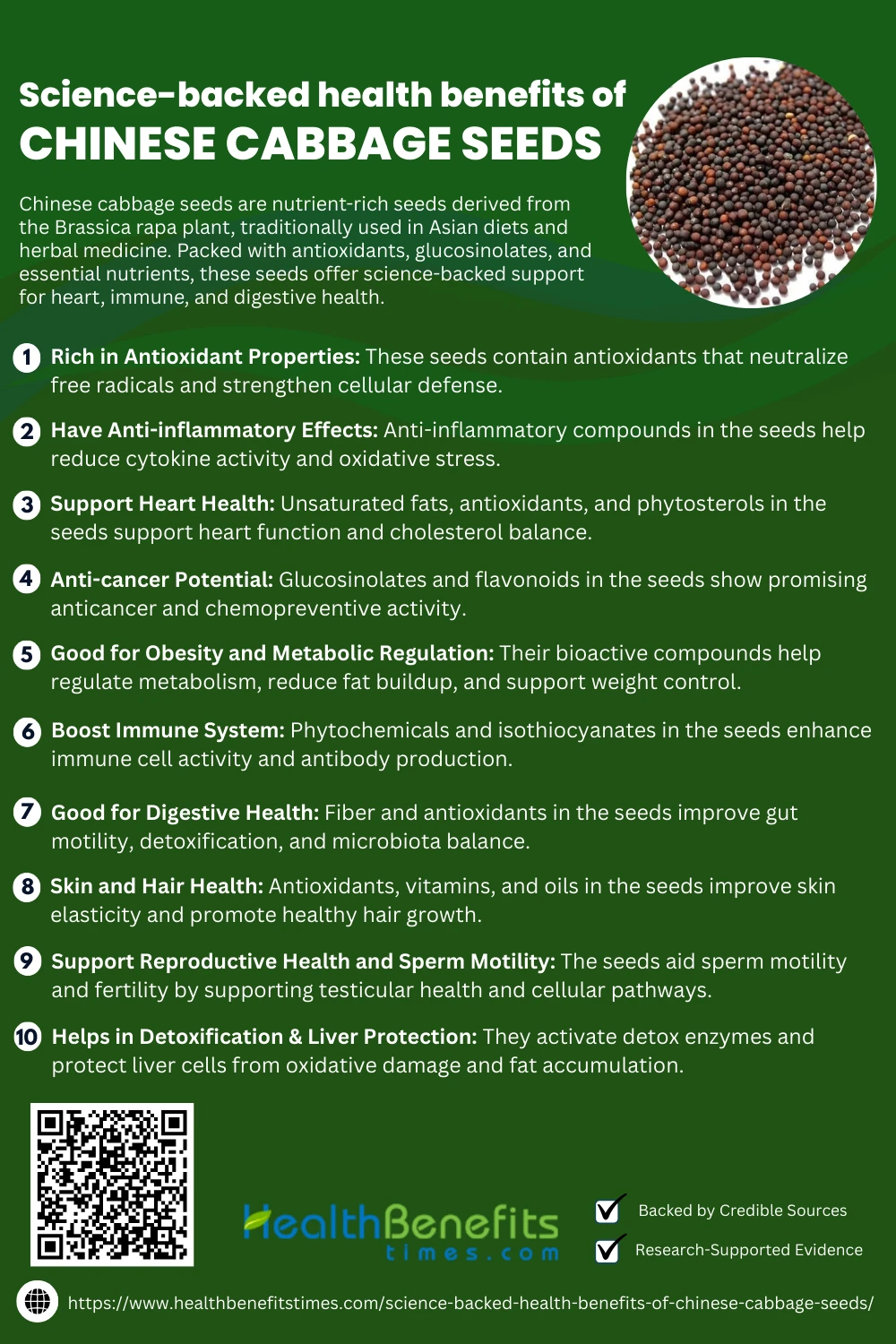 1. Rich in Antioxidant Properties
1. Rich in Antioxidant Properties
Chinese cabbage seeds contain potent antioxidants like glucosinolates and polyphenols, which play a key role in neutralizing harmful free radicals. Studies reveal that Brassica rapa seeds exhibit high radical scavenging activity, enhancing cellular defense mechanisms. (1) Glucosinolate breakdown products also boost antioxidant efficacy. (2) Cold-pressed seed flours of cruciferous vegetables showed superior antioxidant capacity. (3) Furthermore, cabbage seed extracts and anthocyanin-rich cabbage varieties demonstrated notable antioxidant potential in vitro and in vivo. (4) (5)
2. Have Anti-inflammatory Effects
Chinese cabbage seeds are rich in glucosinolates and omega-3 fatty acids, both known for their anti-inflammatory properties. (6) These compounds modulate cytokine production and inhibit pro-inflammatory enzymes (MDPI). Their polyphenol content also downregulates oxidative stress pathways. (7) Studies on Brassica seed oils confirm reduced markers of inflammation. These effects support chronic disease prevention.
3. Support Heart Health
Chinese cabbage seeds support cardiovascular health through unsaturated fatty acids that regulate blood lipids. Their antioxidant compounds reduce oxidative LDL cholesterol damage. (8) Glucosinolates in the seeds improve endothelial function and vascular flexibility. (9) Additionally, their phytosterols help lower total cholesterol. Overall, consistent consumption may reduce hypertension risk (MDPI).
4. Anti-cancer Potential
Chinese cabbage seeds demonstrate significant anti-cancer potential through their high levels of glucosinolates and isothiocyanates, which are known to induce apoptosis in cancer cells. Research highlights the presence of indole-3-carbinol, a bioactive compound that disrupts carcinogen metabolism. (10) These compounds are particularly effective in reducing colorectal and breast cancer cell proliferation. (11) The antioxidant and anti-inflammatory properties of Chinese cabbage were demonstrated in plant-based vaccine models. (12) Their seeds are also rich in flavonoids with anti-proliferative actions on tumor cells. (13) Furthermore, cancer chemoprevention potential has been amplified by sulforaphane content during sprouting. (14)
5. Good for obesity and Metabolic Regulation
Chinese cabbage seeds contain bioactive compounds that contribute significantly to metabolic regulation and anti-obesity effects. Rich in glucosinolates and polyphenols, they help reduce lipid accumulation and improve insulin sensitivity as demonstrated in studies on plant-based metabolic modulators. (15) These seeds enhance thermogenesis, modulate adipokines, and reduce inflammation linked to obesity. (16) Their antioxidant content further supports liver detoxification. (17) Additionally, fermented Chinese cabbage seed extracts improved gut microbiota balance, which is crucial for metabolic health. (18) Finally, their nutrient synergy supports glucose metabolism and lipid oxidation, aiding weight management.
6. Boost Immune System
Chinese cabbage seeds are rich in phytochemicals that stimulate immune responses by activating macrophages and enhancing antibody production. (18) Their glucosinolate-derived isothiocyanates exhibit immunomodulatory properties, making them effective in supporting cellular immunity. (19) In animal models, seed extracts enhanced leukocyte counts and reduced immunosuppressive effects of drugs. (20) Functional metabolites from cabbage seed fermentation improved gut-mediated immune signaling. (21) Furthermore, studies confirm that antioxidants in the seeds support immune resilience under stress.
7. Good for Digestive health
Chinese cabbage seeds are rich in dietary fiber and phytochemicals that support digestion by improving gut motility and microbial diversity. According to Gupta et al. (2017), the seeds contain mucilaginous compounds that ease bowel movements. Antioxidants in these seeds combat oxidative stress in the gastrointestinal tract. (22) (23) Moreover, their glucosinolate content aids liver detoxification. (24) Anti-inflammatory properties further soothe the gut lining. (25) Finally, bioactive peptides support digestion-related enzyme activity. (26)
8. Skin and Hair Health
Chinese cabbage seeds are increasingly valued for their rich antioxidant and polyphenol profile, which enhance skin radiance and promote hair growth. The Brassicaceae family is known for its dermatological benefits, as highlighted by Segaran & Sundar (2019). (27) Anthocyanins in purple cabbage variants reduce skin aging. (28) Their natural oils offer hydration and UV protection. Vitamin C and A boost collagen synthesis for skin elasticity. (29) ({% trusted %}) Seed extracts also reduce scalp inflammation and dandruff. (25)
9. Support reproductive health and sperm motility
Chinese cabbage seeds may positively influence male fertility through modulation of pollen and sperm cell development. Research indicates these seeds contain bioactive compounds aiding in sperm motility and fertility restoration in genic and cytoplasmic sterility models. (30) Male sterility reversal using cabbage genetics shows enhanced hybrid seed viability. (31) Additionally, metabolomic studies reveal critical regulatory mechanisms supporting testicular health. (32) Transcriptome analyses confirm their role in fertility signaling pathways, reinforcing cabbage seed extract’s value in male reproductive intervention. (33) (34)
10. Helps in Detoxification & Liver Protection
Chinese cabbage seeds offer substantial antioxidant and hepatoprotective benefits. Studies demonstrate their efficacy in mitigating hepatocarcinoma onset via N-nitrosodiethylamine-induced toxicity. (35) They activate phase I/II detoxification enzymes, reduce hepatic lipid accumulation, and protect hepatocytes from oxidative stress. (36) (37) Their bioactive compounds regulate cytochrome P450 enzymes essential in detoxification. (38) Moreover, cabbage extracts ameliorate liver damage in hypercholesterolemic models by modulating antioxidant pathways, emphasizing their nutritional and clinical potential. (39)
How to Use Chinese Cabbage Seeds in your daily diet
Chinese cabbage seeds can be easily incorporated into your daily diet as sprouts, powders, or oil, enhancing meals with their unique flavor and adding essential nutrients and health-boosting compounds.
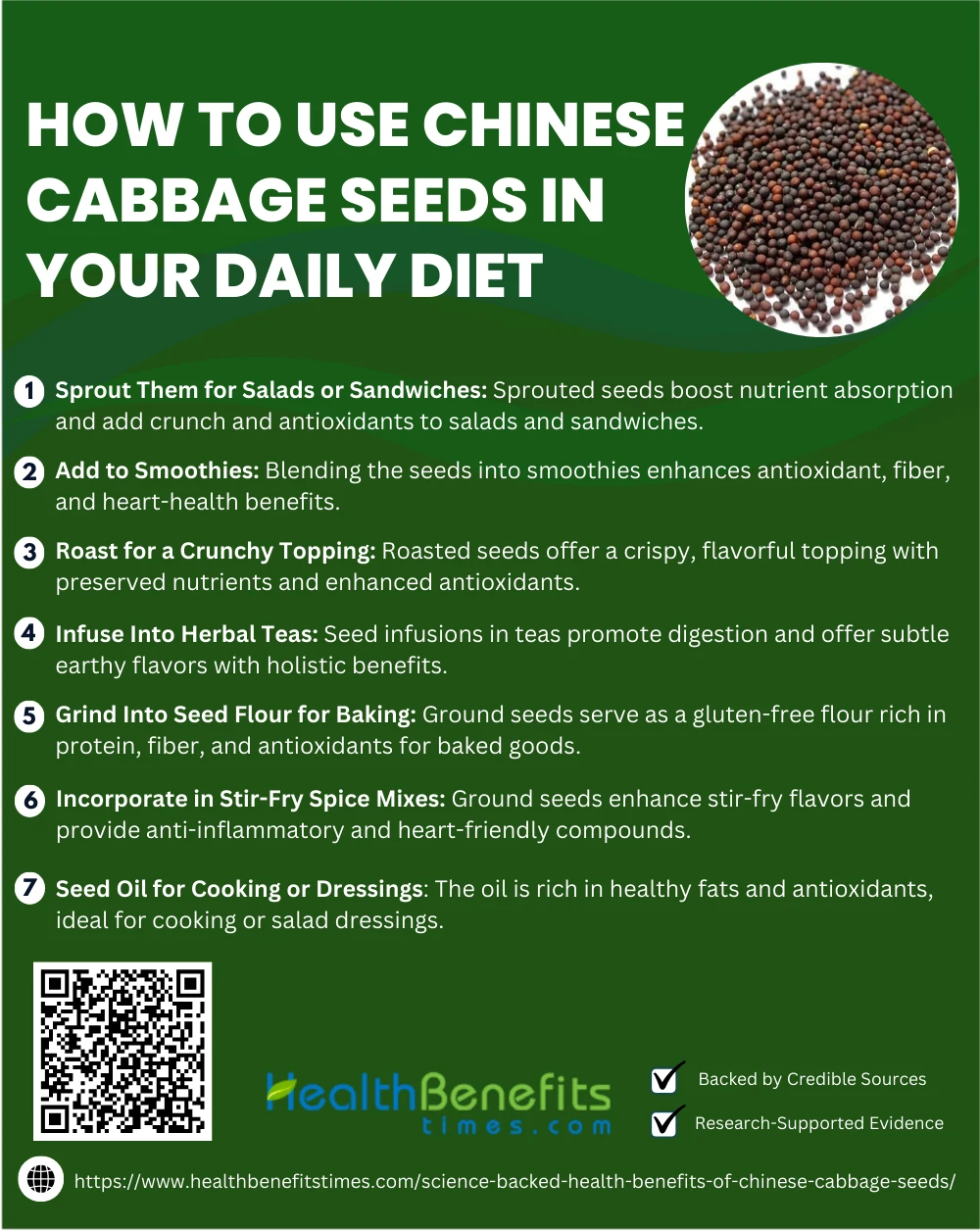 1. Sprout Them for Salads or Sandwiches
1. Sprout Them for Salads or Sandwiches
Sprouting Chinese cabbage seeds is an excellent way to enhance their nutritional profile, making them perfect for salads or sandwich toppings. These sprouts are rich in vitamins, antioxidants, and glucosinolates. Sprouting increases bioavailability and digestibility of nutrients. (40) They’re also praised for their texture and flavor addition to meals. (41)
2. Add to Smoothies
Incorporating Chinese cabbage seeds into smoothies boosts nutrition with antioxidants, fiber, and glucosinolates that may reduce cancer risk. (42) Their omega-3-rich oils support heart health. Sprouted seeds also enhance bioavailability of vitamins and enzymes, improving digestive health (MDPI)—making smoothies a potent and palatable delivery method.
3. Roast for a Crunchy Topping
Roasting Chinese cabbage seeds offers a crunchy, nutritious topping ideal for salads, grain bowls, or stir-fry dishes. Roasting enhances flavor and boosts antioxidant properties, aiding in cellular repair as noted in Celestial Peach’s roasted cabbage method. The process preserves vital nutrients while providing texture, much like Kitchn’s roasting technique. For inspiration, see this crispy fried cabbage variation.
4. Infuse Into Herbal Teas
Infusing Chinese cabbage seeds into herbal teas can enrich the drink’s nutritional profile and support digestion. Used in traditional Chinese medicine, these seeds complement calming herbs like chrysanthemum in this herbal infusion guide. Such teas are linked with holistic healing benefits per the Better Health Channel. These seeds contribute subtle earthiness, enhancing the flavor and bioactivity of herbal blends.
5. Grind Into Seed Flour for Baking
Chinese cabbage seed flour is high in protein and essential fatty acids, making it a nutritious gluten-free alternative in baked goods. It enhances antioxidant properties and fiber content in muffins and breads. Its mild flavor also supports functional food development for health-conscious baking.
6. Incorporate in Stir-Fry Spice Mixes
Adding ground Chinese cabbage seeds to spice mixes enriches stir-fry dishes with glucosinolates that offer anti-inflammatory benefits. (6) Their nutty flavor enhances umami profiles in Asian cuisines. Roasted seeds also release bioactive lipids that support cardiovascular health.
7. Seed Oil for Cooking or Dressings
Using Chinese cabbage seed oil in cooking or dressings provides a rich source of unsaturated fatty acids beneficial for cardiovascular health. Its antioxidant compounds help reduce oxidative stress during high-heat cooking. Additionally, cold-pressed cabbage seed oil supports anti-inflammatory responses when used in salad dressings.
Potential Side Effects of Chinese cabbage Seeds
While Chinese cabbage seeds offer many health benefits, excessive consumption may cause side effects such as thyroid disruption, allergic reactions, or medication interactions, especially due to their goitrogenic and bioactive compounds.
Chinese cabbage seeds contain glucosinolates, which may disrupt thyroid function by inhibiting iodine uptake and hormone synthesis. (43) Chronic overconsumption can potentially contribute to goiter development. Cooking or fermenting the seeds reduces goitrogenic compounds significantly, making them safer for individuals with thyroid concerns.
2. Allergic Reactions
Though uncommon, Chinese cabbage seeds can provoke allergic responses such as rash, itching, or digestive upset, especially in those sensitive to Brassicaceae family plants (MDPI). Protein allergens in seeds may act as triggers in rare food hypersensitivity cases. (44) Heat processing may reduce their allergenic potential.
3. Digestive Discomfort
Chinese cabbage seeds, rich in fiber and bioactive compounds, may cause digestive discomfort such as gas or bloating, especially when consumed in large quantities. (45) Fermentable oligosaccharides present in Brassicaceae plants can aggravate IBS symptoms. Moderation and proper preparation help minimize gastrointestinal side effects.
4. Potential Drug Interactions
Bioactive phytochemicals in Chinese cabbage seeds may alter the metabolism of medications, particularly those processed by cytochrome P450 enzymes. (46) Glucosinolates may interfere with thyroid drugs and anticoagulants. Combining these seeds with medication should be monitored under clinical guidance.
5. Cyanogenic Glycoside Content
Chinese cabbage seeds may contain trace levels of cyanogenic glycosides, compounds that release hydrogen cyanide when metabolized. Although usually low in Brassica species, improper processing could elevate risks. Cooking or fermentation can significantly reduce these potentially toxic compounds.
Conclusion
Chinese cabbage seeds are emerging as a powerful natural health supplement, backed by growing scientific evidence. Rich in essential nutrients, antioxidants, and bioactive compounds like glucosinolates, these seeds support overall wellness through anti-inflammatory, antioxidant, and immune-boosting effects. Studies highlight their potential in promoting heart health, protecting against certain cancers, and aiding digestive and liver function. While beneficial, it’s important to consume them in moderation and be aware of possible side effects, particularly for individuals with thyroid conditions or allergies. Including Chinese cabbage seeds in your diet can be a smart and natural way to enhance your health holistically.


